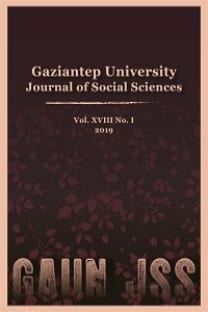Yeni Ekonomi ve Toplumsal Sınırlar: İzmir’de Örgütsüz Kapitalizmin Kültürel Örüntüsü
New Economy and Social Boundaries: Cultural Patterns of Disorganized Capitalism in İzmir
___
- Bennett T., Savage M., Silva E., Warde A., Gayo‐Cal M. ve Wright D. (2009), Culture, class, distinction, London, ESRC Center, Routledge.
- Bourdieu, P. (1996), Distinction: a social critique of the judgement of taste, London, Routledge.
- David, H. (2000), The condition of postmodernity: An enquiry into the origins of cultural change, Oxford: Blackwell.
- Di Maggio, P. (1992), Cultural boundaries and structural change: the extension of the high culture model to theatre, opera and dance, In M. Lamont and M. Fournier (Ed.), Cultivating differences: Symbolic boundaries and the making of inequality, (ss. 21-58), Chicago: Chicago University Press.
- Featherstone, M. (1998), Consumer culture and postmodernism, London, Sage Publications.
- Goldthorpe, J. H. (1980), Social mobility and class structure in modern Britain, New York : Oxford University Press.
- Jackall, R. (2009), Moral mazes: The world of corporate managers, London: Oxford University Press.
- Jessop, B. (2002), The future of the capitalist state, Cambridge: Polity Press.
- Kanter, R. (2004), Men and women of the corporation and the change masters, The Academy of Management Executive, 18(2), 92-95.
- Kurtuluş, H. (Ed.) (2005), İstanbul’da kentsel ayrışma, İstanbul, Bağlam Yayınları.
- Kurtuluş, H. (2012), Orta Sınıfların Ortak Paydası Neoliberal Değerler, Express, (127), 10-13.
- Lahire, B. (2003), From the Habitus to an individual heritage of dispositions: Towards a sociology at the level of the individual, Poetics, (31), 329‐355.
- Lamont, M. (1992), Money, morals and manners: The culture of the French and American Upper‐Middle Class, Chicago: University of Chicago Press.
- Lash S. ve Urry J. (1987), The end of organized capitalism, Wisconsin: University of Wisconsin Press.
- Lash S. ve Urry J. (1994), Economies of signs and space, London: Sage Publications. Mandel, E. (1999), Late capitalism, London: Verso Classics 23.
- Peterson, R. ve Kern R.M. (1996), Changing highbrow taste: From snob to omnivore, American Sociological Review, (61), 900-907.
- Sennett, R. (1998), The corrosion of character: The personal consequences of work in the new capitalism, New York: W.W. Norton.
- Sennett, R. (2005), The culture of the new capitalism, New Haven: Yale University Press.
- Smith, N. (1996), The new urban frontier: Gentrification and the revanchist city, New York: Routledge.
- Weber, M. (1978), Economy and society, Berkeley: University of California Press.
- Wright, E. O. (2005), Approaches to class analysis, Cambridge, Cambridge University Press.
- ISSN: 1303-0094
- Yayın Aralığı: 4
- Başlangıç: 1991
- Yayıncı: Gaziantep Üniv. Sosyal Bilimler Enst.
Öğrenen Örgütlerde İç Girişimcilik
Rus Halk Edebiyatında Memorat Türü
Yeni Ekonomi ve Toplumsal Sınırlar: Örgütsüz Kapitalizmin Kültürel Örüntüsü
Distopik Kurgu ve Ümitvar Distopya Bağlamında Ütopyacılık Geleneği
Film Yapımında Ekonomik Bir Destek Olarak Film Sponsorluğu
Kurul Kalesi Pişmiş Toprak Unguentariumları
Süleyman Yücel ŞENYURT, Leyla YORULMAZ
Etnik Restoranlarda Marka Değeri Oluşturulması: İstanbul Örneği
